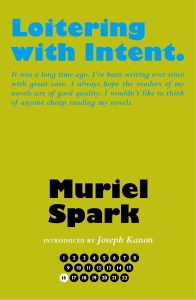The eighties were a difficult time for established artists, as anyone who follows the UK charts will tell you. For Muriel Spark, however, Loitering with Intent represents a relaxed reaffirmation of her art as its final lines – “And so, having entered the fullness of my years, from there by the grace of God I go on my way rejoicing” – decidedly declare. As Norman Page has pointed out, “it initiates a process of revisiting: theme, setting, period and narrative technique all hark back to novels written near the beginning of her career.” And so we have echoes of Spark’s debut novel, The Comforters, in the beginning of Fleur Talbot’s career as a novelist; we return to the period which Spark here describes as “the middle of the twentieth century”; and, in a novel which blurs the border between fact and fiction, not only is autobiography predominant in the plot, but Spark writes in the first person for the first time since Robinson.
Having written her first novel, Warrender Chase “without any great hope of getting it published but with only the excited compulsion to write it,” Fleur takes employment with Sir Quentin Oliver who runs an Autobiographical Association:
“We have all started to write our memoirs, the truth, the whole truth and nothing but the truth. And we are lodging them for seventy years in a safe place until all the living people therein will be living no longer.”
Hired to type up these memoirs, Fleur soon begins to make additions to cheer up the boring parts:
“I had begun to consider them inventions of my own, based on the original inventions of Sir Quentin.”
Far from being aggrieved, the members are delighted by the additions: Sire Eric, for example, whose autobiography she has “livened …up by putting Nanny and the butler on the nursery rocking-horse together during the parents’ absence, while little Eric was locked in the pantry to clean the silver” comments: “I wonder how you guessed that the butler locked me in the pantry to clean the silver.” When he suggests that Nanny on the rocking-horse is going too far, Sir Quentin responds:
“How can you be sure if you were locked in the pantry at the time?”
The novel’s greatest conceit regarding the relationship between reality and fiction, however, lies in Fleur’s belief that real life is copying her novel. Not only does Sir Quentin very much resemble Warrender Chase, but both his housekeeper and mother are all but identical to characters she has created. She remains unfazed by this, however:
“The process by which I created my characters was instinctive, the sum of my whole experience of others and of my own potential self; and so it had always been. Sometimes I don’t actually meet a character I have created in a novel until some time after the novel has been written and published.”
That her comment echoes something Spark has herself said in interview further blurs the distinction between life and art. At one point she speculates:
“It was almost as if Sir Quentin was unreal and I had invented him, Warrender Chase being a man, a real man on whom I had partly based Sir Quentin.”
Of course Fleur’s characters, as Spark reminds us, are, like Spark’s characters, “only words.” (Making Warrender Chase, presented to us as a character in a novel, realer than Sir Quentin, who is purported to be a real man).
Later Sir Quentin will threaten her publishers with legal action over the contents of Warrender Chase, while at the same time borrowing parts of it to insert into the autobiographies of his members. So determined is he to remove all trace of it he persuades Fleur’s friend, Dottie (a friendship which originates in sharing Dottie’s husband) to steal the original manuscript from her flat. The suspense of its recovery is rather spoilt by the fact that Fleur has already revealed its publication as she writes the novel from the vantage point of the future, where she is a successful novelist, an interesting divergence from The Comforters. Instead we wait tensely to see whether Sir Quentin will meet the same fate as Warrender Chase, as Fleur is convinced he will.
Loitering with Intent is a much happier novel than the novels of the seventies. Its criminality – the tit-for-tat stealing of books – is farcical in nature, and, though it begins in a graveyard, it is a poetic graveyard, and there is little in the way of the death or violence which often sneaks up on you in Spark’s novels. Fleur declares her happiness at the beginning – “My morale was high” – and finds, in Sir Quentin’s elderly mother, Edwina, who is regarded by her son as an encumbrance and an embarrassment, a carefree companion. Spark’s novels are always fun, but often fun which makes the reader feel as if he has enjoyed something that perhaps he shouldn’t. Here, it feels as if we finally have permission to enjoy without guilt.

March 2, 2019 at 9:08 pm |
Lovely review Grant! One of my favourite Sparks – as you say, such fun but still with all her quirks!
March 2, 2019 at 9:37 pm |
Yes, I thoroughly enjoyed it. Only six more to go now!
March 3, 2019 at 7:25 am |
Yes, it’s one of my favourites too, very cleverly constructed. I loved the whole life-imitating-art and nested stories elements. She must have had such fun putting it together!
March 5, 2019 at 7:22 pm |
I think you can feel the sense of fun – it doesn’t have much of the nastiness that some of her other novels do.
February 3, 2020 at 7:43 pm |
[…] returns us to the world of publishing in post-war Britain which we saw as recently as 1981’s Loitering with Intent. Since Spark’s debut, The Comforters, writers of various kinds have featured in her work, though […]